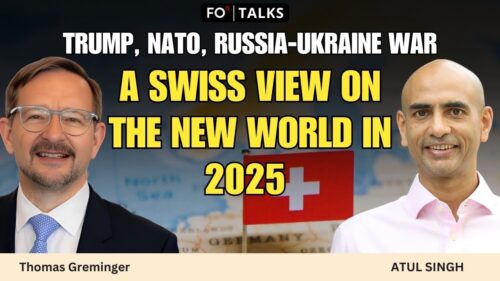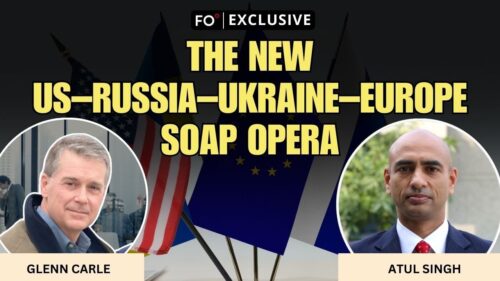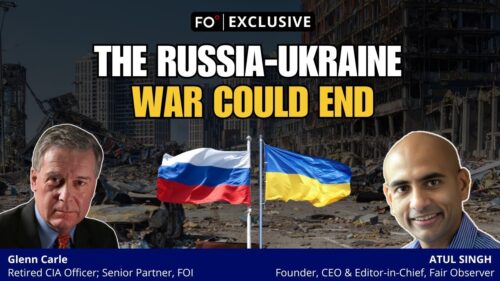Atul Singh: Welcome to FO° Talks. With me is Anna Hryniv, a Ukrainian journalist and communications specialist. She’s living as a refugee in the US, and she visits the National Press Club in Washington, DC, off and on. And therefore, we decided it would be great to have a chat with someone who is from Ukraine, knows Ukraine well, is actively engaged with the Ukrainian cause and will offer a Ukrainian point of view on what’s going on. So, welcome, Anna.
Anna Hryniv: Thank you. Thank you for having me.
Atul Singh: Anna, we are hearing a lot about Ukraine. We’ve been reading that the US has been negotiating with Ukraine. In fact, there was a time negotiations were occurring in Saudi Arabia. We heard Russian President Vladimir Putin calling for direct talks with Ukraine. Now Ukrainian President Volodymyr Zelenskyy says he’s ready to meet Putin personally in Istanbul. What is going on? What do people in Ukraine think about the negotiations?
Anna Hryniv: Yeah, thank you for this question — it’s a great, great question. And before this interview, I spoke with my friend at the front line as I decided that their opinion is the best answer for this question, because they know what is going on. And I asked what they think about negotiation, about Russian opinion, about everything. And I even put it on my paper about what they taught me about it. So they tell me that it doesn’t matter what will be after this negotiation. They’re pretty sure Russia will come back just in the months, or in the year, or in two. So they are prepared for another war, because it just doesn’t work for Russia and it just doesn’t work for Putin.
Atul Singh: I see. So why doesn’t it work? What does Russia really want? What’s the view of your friend?
Anna Hryniv: Yeah, it’s a great question, and we ask this question a lot of times over a lot of years, actually, hundreds of years — what Russia wants from Ukraine. But they don’t want Ukraine to change something, to change their policy, or to change the president. They want Ukraine to be part of the Russian world, and it’s never happened. That’s why this war is so long, and that’s why it’s gonna be so long if we’re gonna think that it’s so easy to negotiate with Russia. And the other reason, the other thing I want to explain that my friend told me is that it’s pretty hard for Ukraine to be part of this war, but nobody wants peace more than Ukraine now. Nobody.
Ukraine’s Western dream vs. Russia’s empire
Atul Singh: Hmm. So tell me something and tell me if what I’m hearing is true. I hear from a number of American friends that when they speak to Ukrainians, they say that Ukraine wants to be part of the Western world. It wants to be part of the EU, it wants to be part of NATO, it wants to be part of the freer economies of the West. And they see the West as historically expanding east. After all, Poland was part of the Communist Bloc, but Poland now is a very dynamic economy, and a very important member of the EU and a very important member of NATO. So the American view is Ukrainians want pretty much what the Poles want, and what the Russians want is to retain Ukraine as part of the Russian world, of their sphere of influence, because they see Ukraine as home to the kingdom of Rus. They also see Ukraine as part of the former Soviet Union, and they have their fleet in Crimea. Do you think these two views are hitting each other, are colliding? Is that what’s at stake?
Anna Hryniv: So yeah, you’re absolutely right about the Ukrainians wanting to be part of the West part of the world. And from what I see, Ukraine is a pretty Western country now. It’s a part of the world’s democracy. Ukraine changed. It’s a young country, but it’s changed. It’s modern, it’s brave, on the one side. On the other side, what are Ukrainians fighting for? It’s not only about wanting to be part of the European Union, or for the West part, or the US part. It’s not about this. It’s about: You cannot just change borders by force. That’s the main idea. Because it started with Ukraine, but it could be any other country, and it’s really a bad future to understand that any other country can change the borders of any other country just by force. That’s what we are fighting for.
Atul Singh: I see. But the truth is that over history, most borders have changed thanks to force. Germany has its current borders because they lost in World War II. Austria, the same. And you could say the same about so many countries. I mean, India has its borders today because the British left us with those borders. So I agree with the principle, but reality and history are different, right, Anna?
Anna Hryniv: It’s a great point. But we can tell about a lot of things that were like that: women’s rights, human rights, different countries. And we cannot always say it was like that every time. No, we live in a modern and different world when you cannot just change the border if you want. You cannot just do a deportation of 20,000 kids from your country just because you want to do it. You cannot just murder a whole city as in Mariupol just because you want to do it, because someone did it before. It’s not how it works. We have some rules and world order, and we should respect it.
Ideals collide with the new world order
Atul Singh: Yeah, but here’s the thing: A lot of people are saying that world order has taken a beating. We are now living in a new order, particularly now when you look at what’s happening in the Middle East, look at what’s happening in Gaza, look at what’s happening in South Sudan. India and Pakistan just had a major fight, and that was to change borders in some ways, especially on the part of Pakistan. So we are again back to a more violent era. And the classic example, perhaps, is Syria, where Turkey and Israel — Turkey, which used to have the Ottoman Empire — now is the dominant player in Syria, and Israel has taken some of southern Syria’s territory. So yes, you are saying we cannot do that — that’s a great principle — but we are living in a different world. Does that worry you?
Anna Hryniv: So, I have a question for you as a journalist: Do you think it’s okay to change the border by force?
Atul Singh: I don’t think it is alright. But at the same time, what I’m saying is, this is the world we live in. So what can we do about it? Does that worry you? It worries me.
Anna Hryniv: It’s a great point, and yeah, what can we do about it? We can have an impact. We can save our country, help our countries, if we understand it’s right. This is what all my friends say. Actually, all my friends are from a media background; they are journalists, they are camera operators, they are producers, and they are all now at the front line in Ukraine. And this is the answer for your question: What can you do? Because they are right there. This is their home country, and they cannot—
Atul Singh: So they are fighting for what they believe is right, they are fighting for their territory and sovereignty?
Anna Hryniv: They are fighting for their home. It’s just right. And it’s the same with the Ukrainian community here in the US. What can we do with all our right principles? Not just principles, but do a lot of protests, meetings, rallies and different events, action summits. So just be proactive.
The fight for global support
Atul Singh: Excellent. Now, that brings me on to my next question. You’re obviously very active. You’re working very hard for the Ukrainian cause. So what do you and your friends, and what do other Ukrainians think about the international support Ukraine is receiving? Do you feel that the US and the EU have your back?
Anna Hryniv: Yeah, thank you for this question, and I’ll refer to my friend. I asked him, what does Ukraine need? If somebody asked me, “Okay, guys, we are helping you, we support you. What do you need?” And they answer: “So what does Ukraine want for this question? To be armed, to be able to push Russia back.”
Atul Singh: From whom? From the US and EU mainly, correct?
Anna Hryniv: Yeah, just because it’s really important. Because if Ukraine loses, it’s not just only a Ukraine loss. It’s a loss for the whole democratic world. Just because every country can be Ukraine next. So if we’re not helping Ukraine, we can forget about the peaceful world that was before 2022. So about the community here in the US: From one side, I want to say thank you to all the people who were really supporting us, because I’m — it’s not correct to say refugee, but we’ll say refugee, because the US is protecting Ukrainians. But I really appreciate all the support to Ukrainian people, because you can feel the support when you move from Ukraine, as a human — it’s my personal side — and from the community. So I had a chance to meet people from different states with different political sides, and all of them tell me that they have some supporting project that they help with to move Ukrainians from Ukraine. Then they help host Ukrainians here in the US. They send money to the Ukrainian army. So in every state, with every different idea, political things, every American person I met tells me, “I support Ukraine.” And it was a pretty big surprise for me. So yeah, I think this helps.
Atul Singh: So you think the Americans have your back?
Anna Hryniv: Yeah, I think so, because we can feel it. It’s a bit different from the first year of the war, but I think it’s—
Atul Singh: What’s a bit different? Is there now a little bit of donor fatigue? Is there now a little more uncertainty?
Anna Hryniv: Yeah. I can explain. It’s not as chaotic as it was before, because when this shocking war started, everyone started to say, “How can I help? Where can I send money? Who can live in my apartment?” Now, I feel it’s not that huge, but it’s more focused. So we still feel this help. Of course, we want more, but I mean, anyone trying to protect their countries and home wants more, but we appreciate this help.
Atul Singh: So, question for you, different question. There was a White House meeting which was very controversial. And that White House meeting between the Ukrainian president and the American president and the American vice president didn’t go down very well. Did that affect the morale of Ukrainian-Americans? Did that affect the morale of Americans supporting Ukraine? How did that play out?
Anna Hryniv: Yeah, I can say, from my personal view. So that day, I received, like, hundreds of messages with support from my Ukrainian friends, from my American friends. So, I mean, yeah, we had a lot of questions from this meeting, but from what I see, I received a lot of messages that say, “We support you, we still support you. It’s really important for us to help Ukraine.” It’s not easy to be very diplomatic and be nice when your country is under attack every day. It’s just not that easy when you see hundreds of people killed by Russia. It just doesn’t work like that. I understand this whole world of diplomacy and rules, but it’s not that easy, especially after you spend a week or two in Ukraine. You understand why Ukrainians are acting like that or this really quickly.
Ukraine Action Summit
Atul Singh: I see. So, let’s now talk about the Ukraine Action Summit. You were involved in it. Explain to us: What is it, when did it happen, why is it important, what kind of people attend the summit? Is it mostly Ukrainian Americans, or is it also people from other backgrounds?
Anna Hryniv: Yes, it’s a great question. I really loved this event. So, it was the sixth Ukrainian Action Summit, and the idea of this summit is to bring all people who want from all the states to go to their representatives and talk about Ukraine. Super easy, but really productive. And from what I see working with different communication activities, this is the best way to support Ukrainian ideas. So not only do some protests and rallies, but go to your representative and tell him about Ukraine. Tell him to support some decision about Ukraine. Tell him to support some, I don’t know, laws with refugees, some support of arming Ukraine. Representatives are the key to Ukrainian support. So we decided to do that project with the Coalition for Ukraine, and we brought together 600 Americans. Part of them were American with Ukrainian roots, part of them not — just, like, no connection with Ukraine. They just feel they want to support Ukraine. So it was a really, really productive and great meeting.
Atul Singh: I see. And does this lead to more support on Capitol Hill, more support from the American media, more support from American civil society? Is that the long game?
Anna Hryniv: Yes, exactly. This was the idea. It’s not only about this event. It’s not enough to do just one Action Summit. That’s why it’s not the first and not the second. We understand we’re gonna do more. But it really changed minds. It really helps. And I used to work with members of the Parliament, so I know how it works. It’s impossible to know everything about what’s going on in your county, for example. You listen to people that live there. So it’s the best idea to just be connected with your representative. And if they hear about Ukraine 100 times per day, maybe they’re gonna change their mind.
Atul Singh: I see, I see. Good old electoral politics, eh? (Chuckles) So, let’s talk about Ukrainian refugees in the US. You are a refugee yourself of sorts — you are in New York. What has been your experience in New York and in the US so far?
Anna Hryniv: Yeah, thank you so much. It’s like my third year in the US. Time flies. But it was hard to leave my home.
Atul Singh: Yeah, and by the way, just so that viewers know, you’re from Odessa — that ordinarily beautiful city.
Anna Hryniv: Right, thank you for that.
Atul Singh: If anyone has seen Battleship Potemkin, an early movie, they can see the steps of Odessa. Anna Hryniv is from Odessa, and she told me there are 30 media channels and 300 social media channels in Odessa itself?
Anna Hryniv: Yeah, you’re right, it’s only about the city’s.
Atul Singh: Exactly. So quite a culturally rich city on the Black Sea.
Anna Hryniv: Oh, yeah. Right.
Atul Singh: So, carry on. Tell us, how do you find life here as compared to such an idyllic place?
Anna Hryniv: Yeah, you’re absolutely right. Odessa is beautiful. I hope that everyone who will read or see this interview, you can visit Odessa. I promise I can’t show the city to all Americans who want to see this city. It’s pretty diverse and beautiful. It’s really, really, like, a mix of everything. So yeah, it was pretty hard to leave this city and leave Ukraine. And it wasn’t our choice — it wasn’t the choice of Ukrainians, because we were really happy in our country. I know there are a lot of stereotypes and thoughts about life in Eastern Europe, but from my side, Ukraine is a pretty modern, super cool country that’s beautiful. So it wasn’t our choice to leave. But from another side, I am really grateful to all American people for how easy it was for me to become a part of New York or the country, because everyone who spoke with me when I only moved asked me, “How can I help you? What advice can I give you? Maybe I can help you with this connection. Maybe I can help you with everything.” So it was really easy, if I can say that (laughs) in this story, to become a part of the new country for me.
Atul Singh: I see. And I mean, America is the land of immigrants, and there’s more than an element of truth there. So the experience has been very positive. Now let’s talk about the activities of other people who’ve come from Ukraine — your community. What are the activities you’ve engaged in for the past three years, and what are you planning now?
Anna Hryniv: Yeah, thank you for this question. From what I see, the Ukrainian community here, especially in New York, it’s pretty big and diverse. It’s proactive. It’s different because there’s parts of communities that have been here for, like, years and years, and there’s—
Atul Singh: Some have been there a hundred years or even more.
Anna Hryniv: Exactly. We have the Ukrainian Village. It’s a part of Manhattan. It’s like East Village. It’s a really famous place there. So we have this part of the community, and we have different new Ukrainians that only moved. It’s interesting to see how they connected with each other, because it’s two different worlds. But still—
Atul Singh: Is the older community more religious?
Anna Hryniv: I can tell this, maybe, but not super conservative, I’ll say, yeah. But it’s still different, every generation is different. But this generation grew up here in the US. This generation grew up in modern, different Ukraine. There were different rules with different everything. So yeah, it was pretty interesting to see how this generation and community connected just because we have one goal and one idea. And I can say it connected really well. We did, like, hundreds of events, from something with art to something with protests and rallies and a lot of things. What we do, we do now in DC, just because I see it works better. Just because, from what I see and what I talked about before, it’s not enough now just to be seen on the streets or just speak with journalists. You need to push your opinion to officials, because they can change something in the White House and Congress. So that’s why we moved a little bit of our activities to DC and focused on that part. This is one part of your question, and the other part — what we are preparing for — it’s really important things. And I want to show some statistics, some numbers. So, like, 669 kids were killed by Russia—
Atul Singh: When?
Anna Hryniv: From February [2022], from starting this war.
Atul Singh: Over three years?
Anna Hryniv: Over three years. And 20,000 were deported to Russia. Two thousand were injured by Russia. Millions have to leave their countries. So now we’re preparing them an event. It’s going to be the first of June. It’s called Children Praying for Children. We’re going to do a big, big event in every state, including DC as well, to bring these numbers, to talk about this and to pray for Ukrainian kids.
Fading attention and enduring resolve
Atul Singh: I see. So all very good, and good luck with your future activities. I have a difficult question for you now, and it may be difficult personally for you. We have a lot of conflicts going around the world. We know about Israel–Gaza, that is attracting a lot of media attention. You move to the south, you have the Houthis in Yemen. You move to Africa, there’s South Sudan. Lots of people have been displaced, a lot have died. You move east, you get to Iran. Iran–US tensions are high, there are negotiations going on. You move further east, you’ve had Pakistan and India, two nuclear powers, almost go to war. They’ve just had a ceasefire, but things are tense. So with all of this going on, and with so many different tragedies, with so many children in so many countries dying, do you think that global attention for the Russia–Ukraine war is going down? And if so, how do you feel about this? What do you plan to do about this? And what are, in your view, the likely consequences?
Anna Hryniv: Yeah, it’s a great question. Thank you for that. You’re absolutely right. And as a media person — you’re from the media, you have a huge media background — we understand that this is how it works in psychology. So it’s okay to focus on something else, but—
Atul Singh: I’m also a historian by training, so I’m not your typical media person.
Anna Hryniv: Yeah, so you understand how—
Atul Singh: I’m just saying that there are huge trends, long-term trends, and so sadly, sometimes because of that, human nature gets overwhelmed. So it’s a difficult question.
Anna Hryniv: You’re right. It’s human nature. And from what I understand, working as a volunteer, helping with all these Ukrainian fields and projects — it’s okay to understand that people cannot be focused on Ukraine 100% of their time. It’s okay to understand this information and then work with that, not trying to be rude and say, “Oh no, you need to read about Ukraine every day. You need to know about Ukraine. You have to know, you have to.” It’s not how it works. It’s war going on in my home, so—
Atul Singh: It matters to you, of course.
Anna Hryniv: Yeah, it’s necessary for me to talk about it. It’s necessary for me to do some action with this. I understand it’s going to be like this. It’s hurtful, it’s hard, because that’s my own city, Odessa, is under attack every day. And when we say it’s under attack with drones, we don’t mean small drones; it’s the big machines. So my own family had lost in this war. It’s just super heartbreaking. But on another side, I understand this is how it works, and we should know how to deal with this. And that’s why we’re creating every day something new — some events, some topics, something to do with this. Just because this is the only way we can change it and help, of course, our army to fight back.
Atul Singh: Got it. So you recognize that global attention has indeed gone down, but you’re trying to stay current, stay relevant, and fight for your cause, correct?
Anna Hryniv: Absolutely. Absolutely.
Atul Singh: Great. Anna Hryniv, thank you for your time. It’s been a real pleasure. We’ll have you back. It’s great to have a Ukrainian perspective on the war. All the very best with your work, and we’ll see you soon.
Anna Hryniv: Thank you very much.
[Lee Thompson-Kolar edited this piece.]
The views expressed in this article/video are the author’s own and do not necessarily reflect Fair Observer’s editorial policy.











































Comment